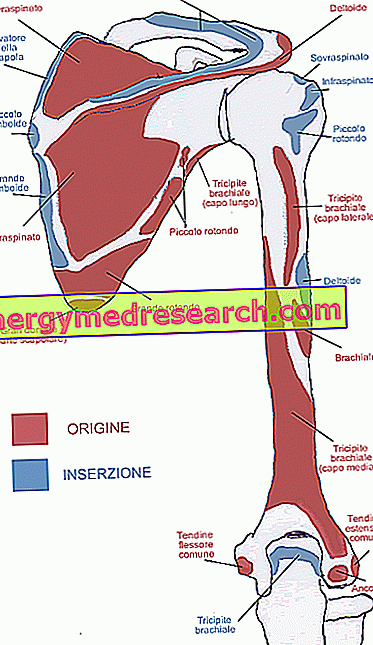Definition
Amyotrophic lateral sclerosis is a serious neurodegenerative pathology, the target of which is motor neurons located in the central nervous system (brain and spinal cord).
Probably, this pathology is better known by the acronym "ALS", but it is also known as Gehrig's disease or motor neuron disease.
Generally, ALS occurs in patients over 50 years of age.
Causes
As mentioned, amyotrophic lateral sclerosis is caused by a progressive degeneration of the motor neurons. The exact cause of this phenomenon, however, has not yet been fully identified. However, there are many hypotheses about it.
Among the possible causes that can be hypothesized may favor the development of neuronal deterioration, we recall: the presence of a family history of ALS, an imbalance in the levels of glutamate in the cerebrospinal fluid (which can cause toxicity towards motor neurons), the formation of protein aggregates within motor neurons, the accumulation of waste toxic substances within motor nerve cells, a mitochondrial dysfunction, the lack of neurotrophic growth factors inside the motor neurons and a malfunctioning of glia cells.
Furthermore, it appears that individuals with smoking habits and individuals exposed to chemicals or lead and other metals are at greater risk of developing ALS.
Symptoms
The symptoms of ALS usually begin to appear starting from the upper and lower limbs, hands and feet and then spread to all the muscles of the body, including respiratory ones.
Patients with ALS, therefore, may experience symptoms such as difficulty walking, weakness in the legs and arms, tremors, speech and swallowing difficulties, muscle cramps, inability to maintain correct posture, joint stiffness, hoarseness, wheezing and breath short.
These symptoms appear gradually and tend to get worse over time.
In the final stage of the disease, the patients are paralyzed, therefore, they are forced to use the wheelchair, they are no longer able to speak and eat.
The disease also affects the respiratory muscles, therefore, patients need mechanical ventilation to breathe.
Information on SLAs - Drugs to Treat Amyotrophic Lateral Sclerosis is not intended to replace the direct relationship between health professional and patient. Always consult your doctor and / or specialist before taking ALS - Drugs to Treat Amyotrophic Lateral Sclerosis.
drugs
Unfortunately, there are currently no drugs for treating ALS. The implications of this disease are always tragic. Generally, death occurs due to severe respiratory failure, after a period of about 3-5 years from the onset of the disease.
However, there is a drug that is used in the treatment of ALS: riluzole. This medicine seems to be able to slow down the course of the disease, but not to stop it. Furthermore, the response to therapy varies from patient to patient and the results are not always as expected.
Next to a possible riluzole-based therapy, therefore, a symptomatic type of treatment is performed, aimed at reducing - as far as possible - the symptoms induced by the disease.
Patients with ALS can be helped through physiotherapy, speech therapy and occupational therapy. In the final stages of the disease, however, mechanical ventilation and artificial feeding are used.
Finally, it is not unusual for ALS patients to experience depression; therefore, in these cases even psychotherapy can help.

riluzole
As mentioned, riluzole (Rilutek ®, Riluzole Zentiva ®) is the only drug currently approved for the treatment of ALS. This active ingredient works by reducing the release of glutamate in the brain and spinal cord. The reduced secretion of this chemical messenger can be useful in preventing motor neuron degeneration that characterizes amyotrophic lateral sclerosis.
Riluzole is available for oral administration in the form of tablets or oral suspension.
The dose of drug usually used is 50 mg, to be taken twice a day, with an interval of 12 hours between one administration and another. It is very important that riluzole is always taken at the same times of the day (for example, in the morning and in the evening).



